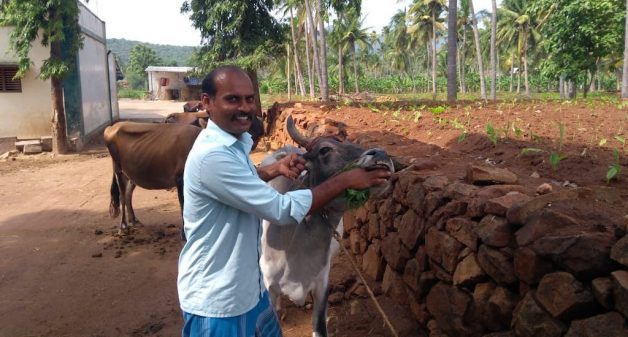For Sakthivel M. (34) of Karkoodalpatty village in Namakkal district, who has been rearing cows for the past six years, it was nothing short of a miracle to see his cow that had been sick for two-and-half years to start lactating again.
“It was while looking for an alternative medicine to tend to one of my cows that I read about herbal medicines in a Tamil magazine. With guidance from a veterinary doctor and just a month’s treatment using ethno veterinary medicine (EVM), my cow recovered fully,” said Sakthivel.
Rajaram T. (35) of Keeranur village in Pudukottai district said that when his livestock gets sick, only herbal medicines help them get well. Like Sakthivel and Rajaram, farmers in Tamil Nadu are increasingly switching to ethno veterinary medicine that not only cures their livestock but costs a fraction of allopathic medicines.
Ethno-veterinary medicine
Ethno-Veterinary Medicine or EVM is branch of medical science that uses local knowledge or practices for healthcare management of livestock.
With educational videos on social media channels and workshops conducted with government support, there has been an increasing interest in EVM. Yet farmers like Sakthivel feel that there are certain practical difficulties such as the lack of ready-to-use formulations for various diseases.
Farmer Rajeshwari U. (28) of Nadukuppam village in Villupuram district has a simple solution. “Dairy farmers in our village sit together as a group once a month and make masal urundai (medicinal balls) made of herbs like pirandai, sothu kathazhai, veliparuthi, etc. to boost immunity for our cows,” she said.
“Based on either the season or epidemic, we follow the veterinarian’s instructions, work as a group and make herbal concoctions for the livestock of the entire community,” Rajeshwari told VillageSquare.in.
Cost reduction
Rajeshwari said that the interest in herbal medicines has also brought herbs like aloe vera, pirandai, etc. back to kitchen gardens. “Most of the herbs used in EVM are either commonly available in our gardens or the very least in our neighborhood, which means they cost almost nothing,” she said.

Farmer Prabhukumar (36) tends to nearly 40 cows in his Tiruppur-based NGO Araporul Vealangam that trains farmers in organic farming. He said that the medical cost has come down drastically after opting for traditional herbal medicines.
“Most of the ingredients like jeera, pepper, tulsi etc. needed for EVM are readily available in our kitchens,” Prabhukumar told VillageSquare.in. “While the current monthly cost is Rs. 250, previously I used to spend Rs. 10,000 per month for medical care of our cows.”
Sakthivel said that after switching over to EVMs, he spends only 10% percent of what he spent previously on medicines for his cows.
Allopathy dependence
While the cattle farmers find EVM cost-effective, Sakthivel and Prabhukumar said that most farmers find it difficult to trust and wait patiently for the herbal medicine to work.
“Though I use herbal medicine, if there’s an epidemic in the neighborhood, I immediately go for vaccines,” Rajaram told VillageSquare.in. With close to 300 hens in his coop, he said that he would not risk relying on EVM.
Rajaram regularly uses a concoction of turmeric and jeera to build immunity for his poultry and trusts traditional systems for cure. However, he prefers allopathic vaccines for disease prevention or epidemic control.
Standardization of EVM
Parvathi M., who conducts workshops on indigenous medicinal plants and herbal remedies in Auroville, said that there are practical difficulties in the system. “When one sources these ingredients, one can sometimes wrongly use a similar-looking herb,” she told VillageSquare.in. “The other common query is on the right dosage for various herbs.”
Experts like Punniamurthy N., retired head of Tamil Nadu Veterinary and Animal Sciences University (TANUVAS), have been trying to dispel fears about the efficiency of EVMs. He has been studying and standardizing each treatment – from ingredients and their measures to duration of the treatment.

He has standardized 14 herbal preparations for common diseases such as mastitis, ticks and diarrhea over a period of 10 years and has conducted various government programs to create awareness about EVMs. The herbal preparations have been tested for clinical efficiency for over a decade, under field conditions at the EVM Center of TANUVAS, Thanjavur.
EVM efficacy
Punniamurthy recalled that the foot and mouth disease that spread widely in 2013 made farmers and veterinarians across the state realize the value of ethno veterinary medicine. The combination of aloe vera, turmeric and calcium paste applied externally for three days cured the menacing disease with ease, with a success rate of over 90%.
He acknowledged that the central government played a tremendous role in standardizing and advocating EVM. Indian Council of Agricultural Research (ICAR) sanctioned Rs 80 lakh for documentation and validation of EVM recipes.
“In 2016, Tamil Nadu State Planning Commission sanctioned Rs. 13.72 crore for an Ethno Veterinary Herbal Training and Research Center in Thanjavur. This was useful in bringing the last mile connectivity by training a large number of farmers, faculty and field veterinarians on EVM,” Punniamurthy told VillageSquare.in.
Farmers and field veterinarians in the area have then been trained to use herbs to treat conditions like inflammation, gastroenteritis, rumen disorders, reproductive disorders, mastitis, dermatitis and more. Propagating EVM as a form of primary health care for rural animals also helps preserve the biodiversity of indigenous herbs in the region.
Catherine Gilon is a journalist based at Chennai. Views are personal.








